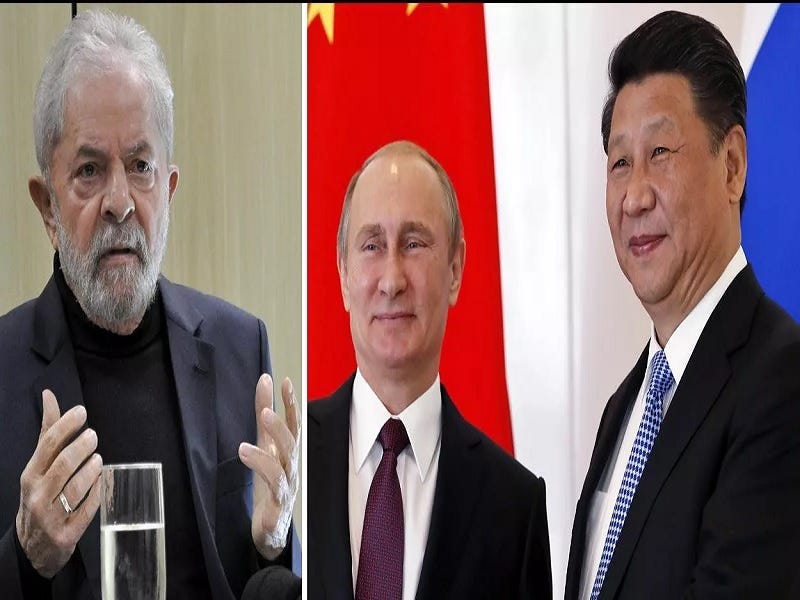The Kremlin’s polar opposite reactions to these two documents, the Lula-endorsed UNGA Resolution that Moscow harshly condemned and President Xi’s peace plan that it enthusiastically supported, enable observers to better extrapolate each of those two BRICS countries’ geostrategic intentions. Lula has arguably recalibrated his worldview to more closely align with the US’, notwithstanding the latter’s agents of influence in Brazil lying that he hasn’t, while China is more confidently challenging the US.
BRICS members Brazil and China espouse similar peacemaking rhetoric regarding the Ukrainian Conflict, which is nowadays actually a NATO-Russian proxy war, but they envisage completely different end games. The first-mentioned’s newly re-elected and now three-time President Lula ordered his country’s diplomats to vote against Russia in the latest UNGA Resolution, the document of which Moscow harshly condemned, while the second’s President Xi just shared a peace plan that even attracted Kiev’s interest.
The reason why Russia was so enraged by the resolution that Lula endorsed is because its fifth paragraph “Reiterates its demand that the Russian Federation immediately, completely and unconditionally withdraw all of its military forces from the territory of Ukraine within its internationally recognized borders, and calls for a cessation of hostilities”. By contrast, President Xi’s peace plan contains no such demand, which is why Russia praised it.
The Kremlin’s polar opposite reactions to these two documents, the Lula-endorsed UNGA Resolution that Moscow harshly condemned and President Xi’s peace plan that it enthusiastically supported, enable observers to better extrapolate each of those two BRICS countries’ geostrategic intentions. Lula has arguably recalibrated his worldview to more closely align with the US’, notwithstanding the latter’s agents of influence in Brazil lying that he hasn’t, while China is more confidently challenging the US.
It also deserves mention that Lula officially condemned Russia in a joint statement with Biden during his trip to DC in early February, which made him the first BRICS leader to do so, something that not even his predecessor Bolsonaro did after meeting with him last summer. Prior to that, Lula unofficially condemned Russia in late January while speaking next to German Chancellor Scholz when he compared its special operation in Ukraine to the US’ Hybrid War on Venezuela.
Furthermore, Color Revolution mastermind George Soros’ ebullient endorsement of Lula in his speech during mid-February’s Munich Security Conference raised eyebrows among observers. This infamous liberal-globalist figure de facto declared Hybrid War on Brazil’s fellow BRICS partner India in that same speech and expressed similar such designs against China almost exactly a year ago. His global network is also such a threat to Russian national security that Moscow banned its operations over seven years ago.
These preceding observations, which are based on objectively existing and easily verifiable facts, constitute the crucial context within which Brazil and China put forth their completely different envisaged end games in Ukraine. While Lula has yet to comprehensively articulate what he has in mind with his G20-like peace proposal, it’ll almost certainly include reference to the immediate withdrawal demand in the latest resolution that he ordered his diplomats to vote for and which offended Russia.
Even in the unlikely scenario that he’s advised to avoid any such reference and dutifully complies, it’s unrealistic to imagine that Russia will seriously consider his bloated proposal due to its prior signals of disinterest, Lula’s spree of anti-Russian condemnations, and China’s more pragmatic peace plan. His decision to have Brazil support that latest resolution demanding Russia’s “immediate, complete, and unconditional withdrawal” from all the territory that Kiev claims as its own destroyed diplomatic trust.
The Russian-speaking population of Crimea and Donbass, not to mention the other newly reunified regions of Kherson and Zaporozhye, would be slaughtered by Kiev’s NATO-backed Neo-Nazis if Moscow bowed to Lula’s demand, which is absolutely unacceptable for the Kremlin and will thus never happen. That said, the Russian leadership is also pragmatic enough to recognize that it would be mutually counterproductive to punish Brazil for what Lula just did, so ties aren’t expected to suffer.
To the contrary, they might very well expand in the substantive sense of closer energy cooperation if the Brazilian Ambassador to Russia’s plan to that effect ends up unfolding, which is an outcome that all sincere supporters of either – let alone both – should fully support. Some Russian representatives might occasionally pay lip service to Lula’s doomed-to-fail G20-like peace plan as part of their public diplomacy efforts, but it’s expected to otherwise be ignored for the reasons that were explained.
As for Russian-Chinese ties, they’ll comprehensively strengthen even faster than most observers could have previously predicted after President Xi proved himself to be a truly neutral and reliable partner through the pragmatic peace plan that he just shared. That will help keep BRICS on track and mostly functional, thus helping to counteract the disturbing influence that Soros and the US nowadays exert over the formulation of Lula’s foreign policy in his third term, which makes his counterparts distrust him.
After all, he decisively broke ranks with them by becoming the first leader of this group to officially condemn Russia, which he shockingly did in a joint statement with Biden that symbolized Lula twisting the knife in President Putin’s back. It’s his sovereign right to practice whatever policy he believes is in Brazil’s national interests, but there’s no doubt that Lula is siding with the US against Russia in the political sense, though at least he’s not crossing its red lines by arming Kiev and/or sanctioning Moscow.





Lula, The greatest ever! We love and support you always!
What a comparison. China is a superpower with global interests and projection for which the end of the war is crucial in order to give continuity to the plans for the new Silk Road of Euro-Asian economic and trade integration. Brazil, on the other hand, is a regional power that still needs to accelerate and consolidate its development, which involves strengthening Latin American integration, before being able to really influence the situation on other continents.